Diversity in digital health: 2020 annual report
At Rock Health, we invest in healthcare solutions built to impact all of humanity. We believe the best solutions—and businesses—will be created by teams who leverage diversity as an asset, reflecting the broad diversity of the problems that need to be solved and the people that need to be served.
After years of annual research on gender equity in healthcare leadership, we expanded the scope of our survey work this year to include analysis of diverse representation in terms of race and ethnicity, sexual orientation, ableism, and gender. We’re calling this work the Diversity in Digital Health (DDH) initiative. The focus of this year’s work has largely been on racial and ethnic diversity among startup leadership, though we believe studying intersectional identities and other groups in healthcare beyond startups is imperative to the full picture of diversity. We look forward to considering how we can broaden our work—and partner with others—in years to come.
We could not be more pleased to have Dr. Ivor Horn as our partner in this work—as an academic, pediatrician, angel investor, and startup executive and advisor—she has been committed to addressing health inequity and promoting the work of Black and Brown founders throughout her career. When our initial conversations in February of this year quickly cemented into a collaboration, we each committed to bringing a data-driven approach to understand what diversity looks like right now among leadership at US-based digital health startups.
Our intention is to offer a survey and report each year, so we’re eager to hear your feedback on what you’ve found valuable and where we can add to this initial effort. By offering a baseline of data—that we’ll build out longitudinally—we hope to advance conversations and start new ones. We hope to stay curious about entrenched systems and ways of doing business that can be exclusionary—and surface inclusionary practices. We hope to learn from the experiences of entrepreneurs and investors affected by those practices, and continue to stay curious about what we all can do to support diverse and inclusive teams to make healthcare massively better.
When we started this research, a few key questions were on our minds to better understand diversity in digital health:
- Are there meaningful differences in representation between digital health leadership and the general population (i.e., the people healthcare companies seek to serve)?
- Does identity play a role in the degree to which different groups of founders access capital?
- Are there differences in how founders of different races and ethnicities experience the challenges of building a business in digital health?
Led by curiosity and a data-driven mindset, we put together a 33-question survey to hear directly from leaders in digital health—we included managers, directors, VPs, C-suite executives, and founders. After analyzing 678 survey respondents—we can say “yes” to the questions above, for our survey population.
Our survey methodology
We surveyed leaders—managers and above—at US digital health startups from July 17 through September 6th, 2020. Survey respondents were asked about the characteristics of the company they work for, experiences they have had building and leading digital health startups, and their personal demographics—including, gender, race and ethnicity, sexual orientation, and disability status. Because of the sensitive nature of some of these questions, a trusted third party de-identified all responses (i.e., removing company name) and then transferred the data to Rock Health and Dr. Horn. Individuals were not asked to submit their names. All data is reported in aggregate—and cannot be reported by individual, company, or fund.
Our promotional efforts were intended to reach as much of the US digital health startup ecosystem as possible. We shared the survey through Rock Health channels (e.g., social media) and networks (e.g. portfolio companies, Limited Partners). We also benefited from several ecosystem partners—venture funds, accelerators, consultancies—who shared the survey with their startup networks (thank you!). It was important to extend the reach of the survey to people and organizations beyond our existing network to optimize the sample—and there’s more we can do to broaden our reach next year. If you have ideas, let us know!
We expect that our dataset includes an oversampling of some underrepresented populations given the focus of the survey, and outreach to diverse groups. The data is not a representative sample of the digital health startup industry. Instead, it serves as a baseline measure that can offer directional guidance to explore issues more deeply.
To supplement our quantitative data set, we sat down (virtually) with digital health investors and entrepreneurs of color to hear their experiences and insights. In many ways, our data shows that their stories are illustrative of the experiences of many. We’ve included their insight and select quotes in the full report to shed light on their experiences. Thank you to the five investors and eight entrepreneurs who provided us with their time and insights!
A Look at our Survey Respondents
Here is an overall snapshot of the survey respondents (for a complete picture of respondents and segmentation, please download the full report):
- 678 respondents who are leaders (managers, directors, VPs, C-suite executives, or founders) at US-based digital health startups.
- Gender identity largely matches US Census data: 48% of DDH survey respondents identify as men, 49% as women, 1% as non-binary, and 2% did not report their gender.
- DDH respondents have greater variation from the US Census from a race and ethnicity standpoint. Though White representation is consistent, Asians are overrepresented among DDH respondents compared to the Census, while Blacks and Hispanics are under-represented.
- 87% of DDH respondents identify as straight (heterosexual), 4% as gay/lesbian, 2% as bisexual, 1% as queer, and 6% of respondents preferred not to share their sexual orientation.
- 11% of DDH respondents identified as living with a disability, 84% identified as not living with a disability, and 5% chose not to disclose their status.
- The sample included 253 founders and 425 leaders (non-founder roles).
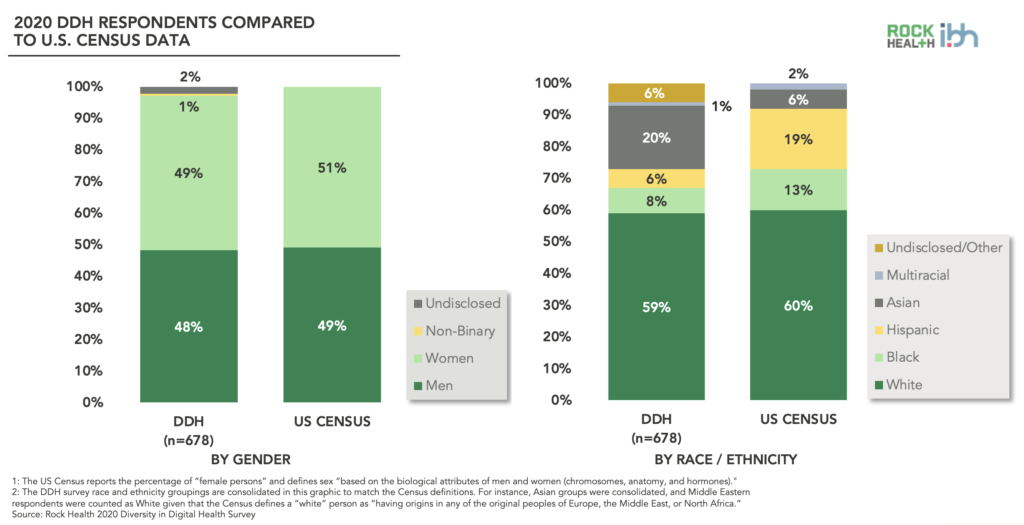
We highlight four key findings from the survey responses below. You can also download the full report here.
1. Founder respondents reflected greater racial / ethnic diversity compared to other management positions.
The 253 founder respondents reflected greater non-white diversity than the 425 leader respondents in non-founder roles (e.g., managers, directors, VPs, C-suite). Specifically, there is less Asian, Black, and Middle Eastern representation among the non-founder group.
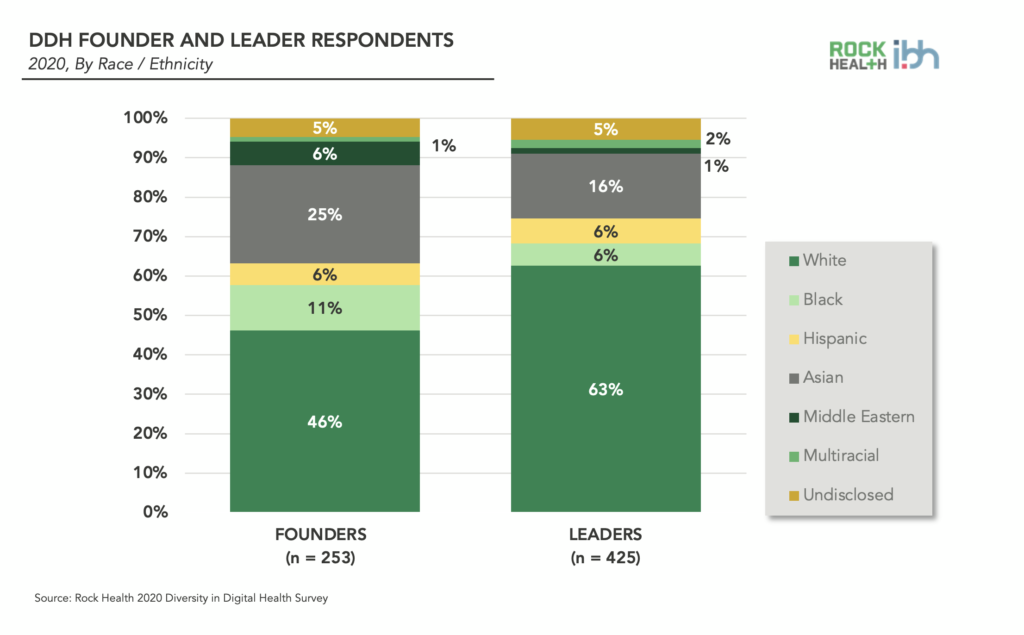
Though we cannot draw direct conclusions from this data, it does raise important questions to consider about the diversity of the leadership pipeline in digital health. A common assumption is that diverse representation among the highest leaders of the organization—such as among the founders—will cascade to the rest of the organization. Our data does not validate this assumption, so instead we suggest asking: how are organizations creating intentionality and leveraging tactics to ensure diversity across all leadership layers?
2. Regions with the most White and Asian founders have higher average deal sizes and receive the majority of digital health venture funding.
Meaningful differences emerged when analyzing the race and ethnicity of founder respondents across the country. Black and Hispanic founder respondents are most heavily represented in specific geographies, namely the South and Midwest (i.e., these founders indicated that their company HQ is located in these regions). In fact, despite a higher volume of total founder respondents in the West and Northeast, there are more Black founder respondents in the South alone than in the West and Northeast combined.
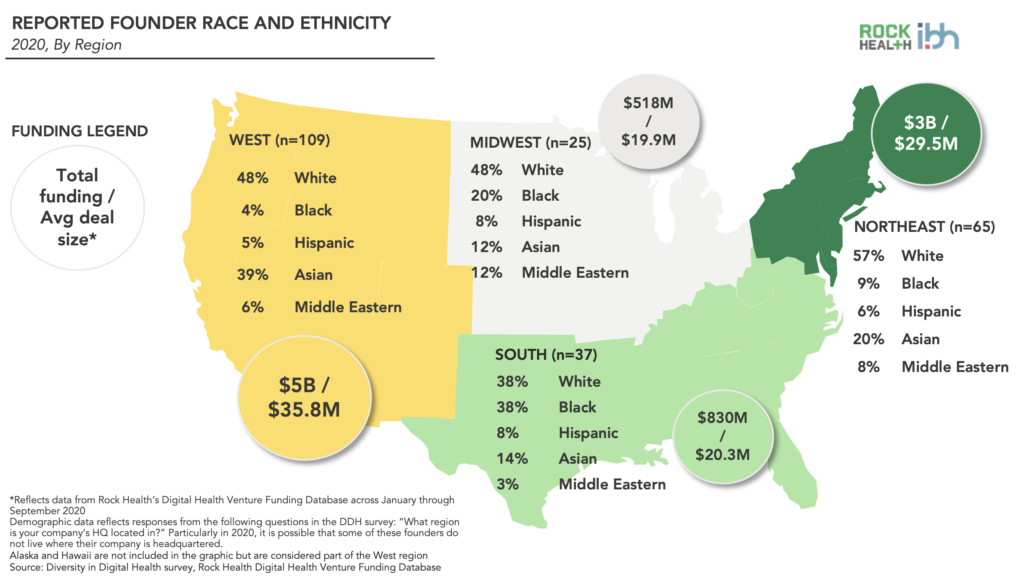
The location of founder respondents is particularly striking when compared to where venture investment flows. Rock Health’s Digital Health Venture Funding Database reports that across January through September 2020, the following venture capital was invested across the four regions:
- West: $5B, with an average deal size of $35.8M
- Northeast: $3B, with an average deal size of $29.5M
- South: $830M, with an average deal size of $20.3M
- Midwest: $518M, with an average deal size of $19.9M
It stands to reason that those regions with the most founders will garner the most investment dollars—but the average deal size indicates that venture-backed founders in the West and Northeast are accessing more capital (per deal) than their Midwestern and Southern counterparts.
This data suggest investors have an opportunity to diversify their pipelines and portfolios by tapping into hubs of talent across the US that may be under-capitalized. We hope this data encourages investors to evaluate their own geographic footprint—how might their footprint impact the diversity of their deal flow? In the new world of remote conferences and meetings, how might investors build relationships with founders and communities outside of their close network, with a goal of connecting with diverse talent?
3. The methods to fund a startup—venture capital, angel investment, bootstrapping—differ significantly across intersectional identities: Asian men are the most likely to be venture-backed, while Black women are the least likely.
The DDH survey data shows significant differences in how founder respondents across different races and ethnicities have funded their companies. White and Asian founder respondents are more likely to be venture-backed than their Black, Hispanic, and Middle Eastern counterparts. And while 41% of Black founder respondents bootstrapped their company, under a quarter of White and Asian founder respondents reported doing the same.
The data also reveals significant funding differences between men and women founders. Nearly two-thirds of men founder respondents are venture-backed, compared to 40% of women founder respondents. This starts to explain why women raise just a fraction of total venture dollars. Rock Health’s Digital Health Venture Funding Database reports that women CEOs closed 15% of all $2M+ digital health deals in 2020 through Q3, accounting for 14.7% of funds raised. Cross-industry findings show even less funding for women, with Pitchbook reporting that just 1.8% of venture capital in 2020 through October 5 was raised by women founders, down from 2.6% in 2019.
One might assume from these funding rates that there are fewer women founders than men. Our survey garnered responses from 141 men founders and 104 women founders—a 58% / 42% split that wouldn’t account for the significant disparities in digital health funding referenced above (85% / 15%). Our DDH survey data instead suggests that women digital health founders are less likely to be venture-backed (40% of women founders compared to 62% of men founders).
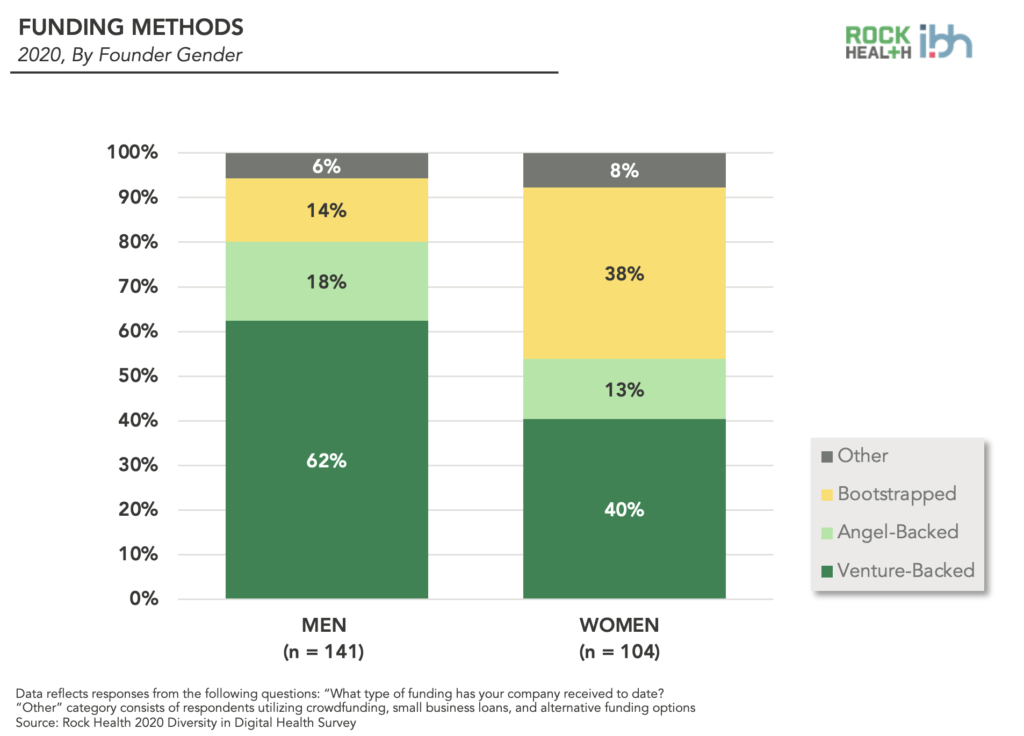
Differences in funding approach are most pronounced from an intersectionality point of view. Asian men respondents are the most likely to be venture-backed (72%) and least likely to bootstrap (11%) their digital health startups. Black women respondents are the least likely to be venture-backed (14%) and most likely to bootstrap (57%). We did not include Hispanic or Middle Eastern founder respondents in this analysis due to the lower sample size.
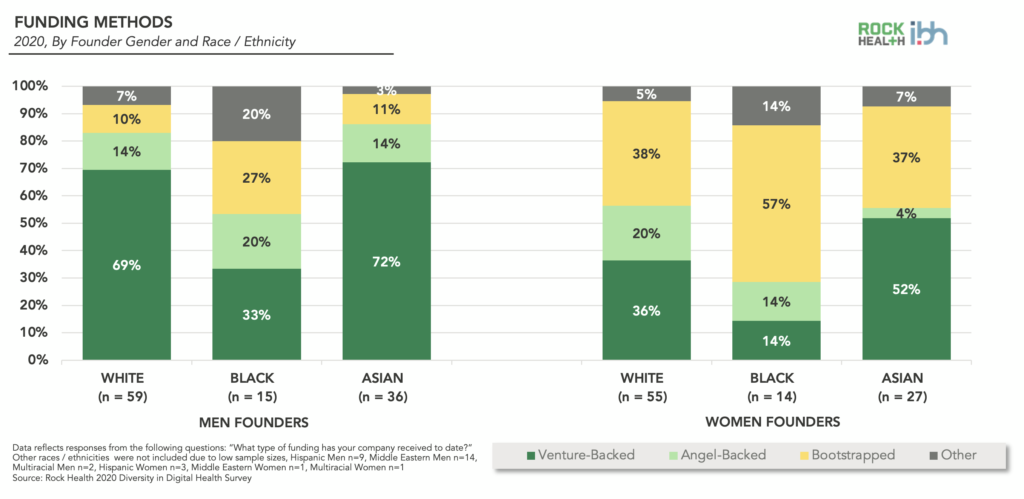
Access to capital can be a critical success lever for founders looking to grow and scale their companies. This is true in healthcare, when product development and validation, enterprise sales, and regulatory hurdles can require significant upfront capital. The differences in funding approaches outlined above are unlikely primarily driven by preference (i.e., based on our interviews, we don’t believe Black women have a much higher preference for bootstrapping—rather, venture capital is less accessible to certain groups). It is possible that certain groups may be more likely to build companies that do not require venture capital and yield venture returns, but we want to spotlight the bias that likely plays into these funding disparities. In fact, our survey finds that Black leaders rate access to capital and investors as more significant barriers to building their companies relative to their White and Asian counterparts (see our fourth finding below). When considering who is most likely to access venture capital, racial bias may be at play, as well as gender bias. One study suggests that differences in how investors assess (and question) men and women entrepreneurs lead to funding disparities. Specifically, investors are more likely to ask women leaders about the potential for losses, while men are more likely to be asked about the potential for gains. We hope our new DDH survey data motivates investors to reflect on their own practices which could disproportionately favor certain groups. We encourage more research to help understand the drivers of funding disparities across intersectional identities.
4. When asked about barriers to building their companies, Black leader respondents rate access to capital and investors as larger barriers than do their White and Asian counterparts.
Being an entrepreneur—and in healthcare (!)—requires tremendous grit and hard work. Many barriers can thwart success—and across the board, all founders acknowledge barriers that, to varying degrees, stand in their path. In the DDH survey, we asked leaders, “To what degree do you feel the following factors have been, are, or will become barriers to building your company?” Factors included: Access to capital, access to diverse talent, access to insights from end users, ability to connect with investors, and ability to connect with mentors and industry experts. There wasn’t a significant difference in how leaders of different races / ethnicities experience these challenges, with a couple notable exceptions (in this instance, we analyzed responses from Founders, CEOs, and President respondents). Black leader respondents were most likely to report ”Access to capital” and “Ability to connect with investors” as more difficult barriers relative to White and Asian leaders.
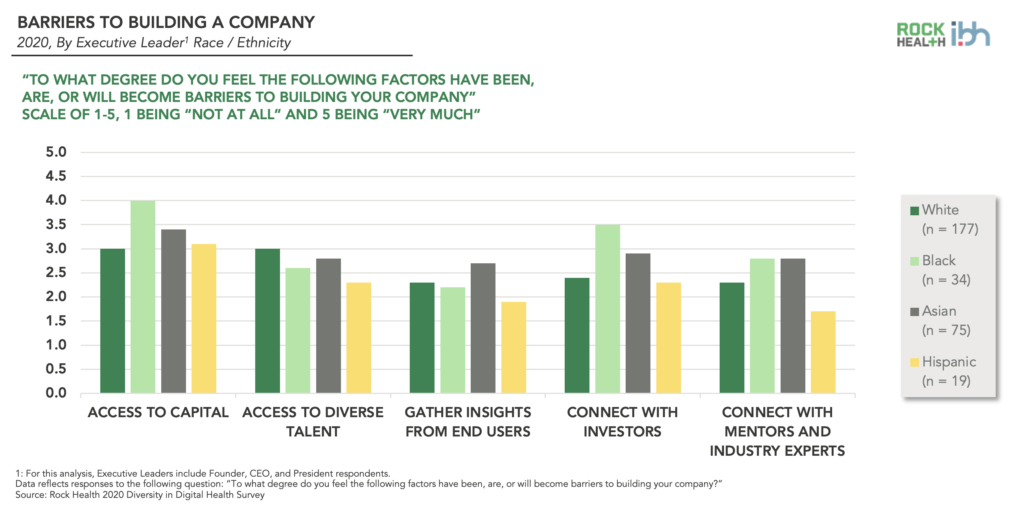
With a national focus on supporting Black Lives Matter in and out of the workplace, conversations have coalesced around the refrain: “Black Founders are over-mentored and underfunded.” Another mantra, “hire and wire,” expresses a desire for investors to move from signaling to action that directly diversifies their teams and portfolio. The DDH data supports the notion that Black founders may face greater access issues than other founders—and intentionality on the part of investors to understand and bridge this accessibility gap is critically important.
What’s next?
We hope this baseline data launches new conversations and offers a means of holding ourselves and our sector accountable for progress. We view this first year as moving from, as Dr. Horn likes to say, “0 to 1, not 0 to 100.” The data has sparked more questions than offered answers—and we look forward to engaging in a dialogue about how our data matches (or doesn’t) to lived experiences, as well as other research and perspectives.
We definitely recommend you read the full report, which features founder spotlights to share some of the incredible wisdom we were lucky enough to access during our research.
Successful strategies are emerging on how investors can best support diversity, equity, and inclusion among digital health startups. Tactics and resources that have informed our own journey at Rock Health include: supporting investors of color; tracking diversity metrics across venture teams, portfolio companies, and deal flow companies; rethinking sourcing to build relationships with new communities; reexamining current practices to understand who is included (and excluded); and perhaps most importantly: staying humble and continuing the learning journey.
If you are interested in additional analyses or have ideas for this work, we’d love to hear from you. Email us at diversityinitiative@rockhealth.com. For press inquiries, please contact press@rockhealth.com.
If you are building a digital health company and seeking early-stage capital, the venture team at Rock Health would love to hear about it. Please submit your information here.


